It’s not always possible to ride outside. You might live where it gets cold and dark early for a third of the year, or your schedule doesn’t lend itself well to being able to ride outside all the time or maybe you’re one of many people who struggle to balance on an outdoor bike and it’s just easier to ride indoors. Whatever the reason, indoor exercise bikes are a fantastic way to get a deep workout in without having to go to a gym.
As much as I love my road bike, I wouldn’t be the cyclist I am today without an exercise bike. Whether I’m training during the week for a century ride or it’s just too dark for me to get out there in the morning when I prefer to be on a bike, indoor cycling on my exercise bike helps keep me active. And because I’m able to set myself up on that schedule, I can easily spin for an hour or two every day and feel great about it. This also means I’ve spent a lot of time testing different indoor exercise bikes to figure out which is the right one for me, and I’ve done my best to share that research here to help you find the best exercise bikes on the market and make the right choice for you depending on your needs.
Every cyclist is different. The space you have to work out in, the kind of cycling you want to do and especially the amount of money you have to spend are all significant factors. This article exists to help you choose which option is right for you, and how each bike can fit into your life. I’ve tried each of these bikes, either anecdotally or as part of a full review, or (in one case) used a similar model.
Looking for a list dedicated exclusively to Peloton-style bikes? Check out our best Peloton alternatives, which includes some overlap with the choices here.

 \n ","topic":"","ttag":"","variant":"","viewguid":"","event":"listicle|image|1","correlationId":"","_destCat":"https:\/\/www.amazon.com\/Bowflex-VeloCore-Indoor-Cycling-Bike\/dp\/B08CS46C7J","productName":"Bowflex Velocore","formatType":"IMAGE","location":"LIST","position":1,"sku":"","dwLinkTag":"article-body|listicle|image","selector":"#article-body #listicle-2ac4662c-cee2-40da-b2c0-0566a42b1966 .itemImage"}}” rel=”noopener nofollow” target=”_blank”>
\n ","topic":"","ttag":"","variant":"","viewguid":"","event":"listicle|image|1","correlationId":"","_destCat":"https:\/\/www.amazon.com\/Bowflex-VeloCore-Indoor-Cycling-Bike\/dp\/B08CS46C7J","productName":"Bowflex Velocore","formatType":"IMAGE","location":"LIST","position":1,"sku":"","dwLinkTag":"article-body|listicle|image","selector":"#article-body #listicle-2ac4662c-cee2-40da-b2c0-0566a42b1966 .itemImage"}}” rel=”noopener nofollow” target=”_blank”>
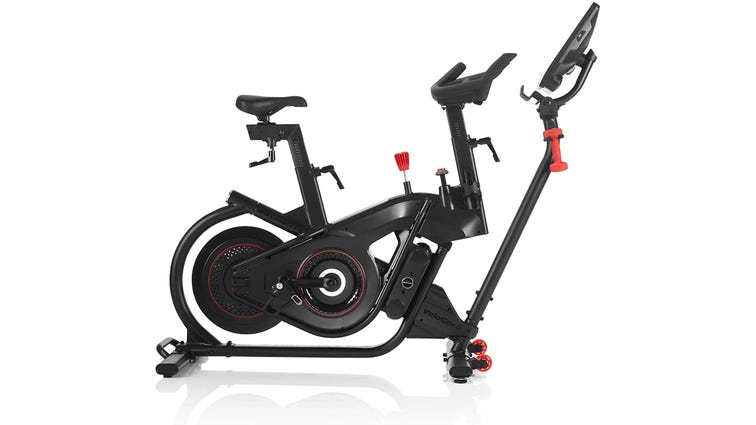

Bowflex
Of all the things you control when choosing the right exercise bike for you, the content on the screen in front of you might be the one people think about the least. Many exercise bikes lock you in to a platform, so you can only train with the videos provided by them. This isn’t necessarily a bad thing, there are a lot of fantastic spin classes and endurance building sessions across the various exercise bikes, but it’s also not hard for some of these videos to feel a little stale after a while.
You get a lot with the Bowflex Velocore bike. It’s surprisingly modular, you can bring whatever shoes and seat and even weights and tablets along for the ride and the design supports it. In fact, on more than one occasion I’ve even taken Zoom meetings from the saddle of this Bowflex indoor cycling exercise bike, and the handlebars supported the design just fine. The magnetic resistance system gives you plenty of challenges regardless of your skill level, and the special tilt system means you can get a core workout alongside your leg workouts. It’s a great all-round experience, but where it excels is everything you can do on the screen.
Bowflex has its own platform with instructors to help you train yourself in a number of ways like most exercise bikes, but there’s a lot more here. Netflix, Disney Plus, and HBO Max are a couple of the apps onboard, so you can enjoy a show while getting in a long distance ride. You can even use Zwift to ride alongside friends virtually, though it’s worth pointing out your performance on this bike isn’t as accurate as you’d get on a dedicated Zwift-approved indoor trainer. No matter what you use, your performance is still tracked and available as a guide to improve yourself.
The only real downside to this bike is its size. At 60 inches long and 24 inches wide, it has one of the larger footprints you’ll find among indoor bikes. The 158-pound body means it’s nice and sturdy, but it also means those with smaller frames may find it’s challenging to move around using the two small wheels in the front.

 \n ","topic":"","ttag":"","variant":"","viewguid":"","event":"listicle|image|2","correlationId":"","_destCat":"https:\/\/www.onepeloton.com\/bike","productName":"Peloton Bike","formatType":"IMAGE","location":"LIST","position":2,"sku":"","dwLinkTag":"article-body|listicle|image","selector":"#article-body #listicle-46723865-3a11-4dda-a2bb-052fe80e8338 .itemImage"}}” rel=”noopener nofollow” target=”_blank”>
\n ","topic":"","ttag":"","variant":"","viewguid":"","event":"listicle|image|2","correlationId":"","_destCat":"https:\/\/www.onepeloton.com\/bike","productName":"Peloton Bike","formatType":"IMAGE","location":"LIST","position":2,"sku":"","dwLinkTag":"article-body|listicle|image","selector":"#article-body #listicle-46723865-3a11-4dda-a2bb-052fe80e8338 .itemImage"}}” rel=”noopener nofollow” target=”_blank”>
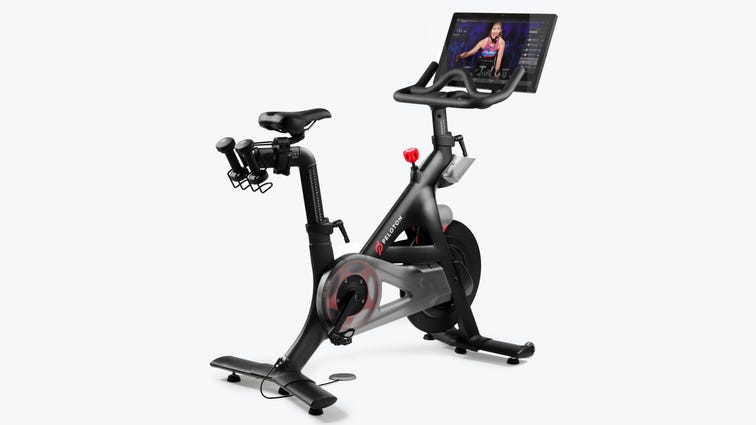

Peloton
If you’ve been looking to buy an exercise bike, you’ve heard of Peloton. It’s the bike on all the commercials, the bike you see celebrities own, and even the bike most likely to show up as a joke somewhere. What you normally see associated with this bike is its rather steep price tag, but if you stop there you’re likely to miss an important detail — you’re getting a lot more than you normally get elsewhere.
Where other exercise bikes tend to feel a little wobbly in places or get a little loud if you don’t sit just right on them just right, the fit and finish of a Peloton eliminates all of that. This feels like it was built for you, it’s incredibly comfortable and every inch is smooth and secure. It has an adjustable seat, handlebar, and screen. The display doesn’t feel like it was added on, it feels like it was purpose-built for this bike. It’s a premium design, and honestly sets the bar much higher for other exercise bikes after you’ve used this one.
Peloton bikes are frequently compared to Apple products in the way they look and feel, but they also have the biggest downside of an Apple product in there’s only one way to use them and that’s the way Peloton says you should use them. Peloton bikes require cycling shoes with cleats to lock in to the special pedals, which adds to your overall cost if you don’t already own them. While it’s undeniably true that cycling cleats increase your performance, it can be frustrating for beginners to start with special shoes.
The classes for Peloton span a wide range of options, but what makes the classes unique is the semi-live feel. Even if you’re not in a live class, which run frequently through the Peloton app, your performance is shown in real time alongside others who’ve taken the class. This is a great way to encourage you to push yourself just that little bit further. Unfortunately, once you’ve owned the bike for a while you’ll find the course structures can become repetitive and many long-term users report difficulties remaining motivated once they reach a performance plateau as a result of this lack of variety.
Peloton offers two different bikes, and while the Bike Plus is the newest and most feature-packed it’s also one of the most expensive exercise bikes you can buy. The standard Peloton Bike has recently seen a price drop, making it much more reasonable to consider putting in your house.

 \n ","topic":"","ttag":"","variant":"","viewguid":"","event":"listicle|image|3","correlationId":"","_destCat":"https:\/\/www.myxfitness.com\/products\/the-myx-plus","productName":"Myx II Plus","formatType":"IMAGE","location":"LIST","position":3,"sku":"","dwLinkTag":"article-body|listicle|image","selector":"#article-body #listicle-e6edcb02-1b16-4f94-b109-8867a091b5d0 .itemImage"}}” rel=”noopener nofollow” target=”_blank”>
\n ","topic":"","ttag":"","variant":"","viewguid":"","event":"listicle|image|3","correlationId":"","_destCat":"https:\/\/www.myxfitness.com\/products\/the-myx-plus","productName":"Myx II Plus","formatType":"IMAGE","location":"LIST","position":3,"sku":"","dwLinkTag":"article-body|listicle|image","selector":"#article-body #listicle-e6edcb02-1b16-4f94-b109-8867a091b5d0 .itemImage"}}” rel=”noopener nofollow” target=”_blank”>
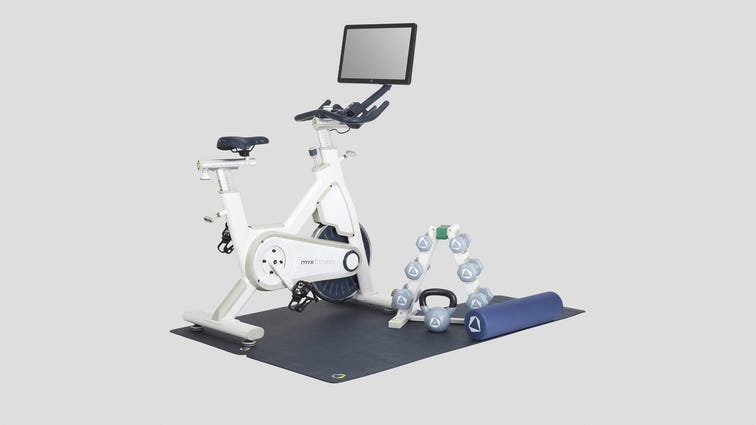

The Beachbody Company
There was a lot of speculation regarding the future of Myx bikes after the company was acquired by The Beachbody Company, and with the release of the Myx II and Myx II Plus we now have an answer. Instead of replacing the experiences Myx fans already know and love, the new parent company added its BODi workout platform as a separate thing you can also do if you choose.
At 54-inches long and 21-inches wide, Myx II takes up less space in your home than most other bikes with a screen attached to them. That 21.5-inch screen looks great and offers a lot of different workouts, but its real functionality is the way it can pivot all the way around. If you do so, you can use the included workout mat to do a lot more than just sitting and cycling. The included weights, resistance bands, and kettle bell allow you to work out your entire body, and there are a ton of classes included to do exactly that. This is similar to what you’ll find in the Peloton Bike Plus, but for considerably less.
Myx II Plus includes Apple Watch support to help you integrate your workout with your Apple Health platform easily, but the included Polar heart rate monitor works well too. And with the reversible pedals you can use shoes with cleats or shoes without. Combine that with the many ways you can adjust your seating position and handlebar height and distance, it’s not hard to say this is one of the most adjustable bikes you can buy.
Like many other exercise bikes, there’s a monthly subscription service associated with the classes you can access on your Myx II Plus. Unlike many other indoor bikes, there are multiple subscriptions depending on the platform you want to use. If you’re a fan of the OpenFit system seen in the original Myx bike, you can pay for just that. If you want access to the live classes and workouts offered by the BODi platform you see at The Beachbody Company, you need to pay for that separately. If you choose to pay for both, this bike gets expensive over time.

 \n ","topic":"","ttag":"","variant":"","viewguid":"","event":"listicle|image|4","correlationId":"","_destCat":"https:\/\/www.amazon.com\/Bowflex-IC-Bike-Series\/dp\/B08XT8XVGY","productName":"Bowflex C7","formatType":"IMAGE","location":"LIST","position":4,"sku":"","dwLinkTag":"article-body|listicle|image","selector":"#article-body #listicle-9d1e943e-87e6-49aa-a534-5e6cd3cc9477 .itemImage"}}” rel=”noopener nofollow” target=”_blank”>
\n ","topic":"","ttag":"","variant":"","viewguid":"","event":"listicle|image|4","correlationId":"","_destCat":"https:\/\/www.amazon.com\/Bowflex-IC-Bike-Series\/dp\/B08XT8XVGY","productName":"Bowflex C7","formatType":"IMAGE","location":"LIST","position":4,"sku":"","dwLinkTag":"article-body|listicle|image","selector":"#article-body #listicle-9d1e943e-87e6-49aa-a534-5e6cd3cc9477 .itemImage"}}” rel=”noopener nofollow” target=”_blank”>
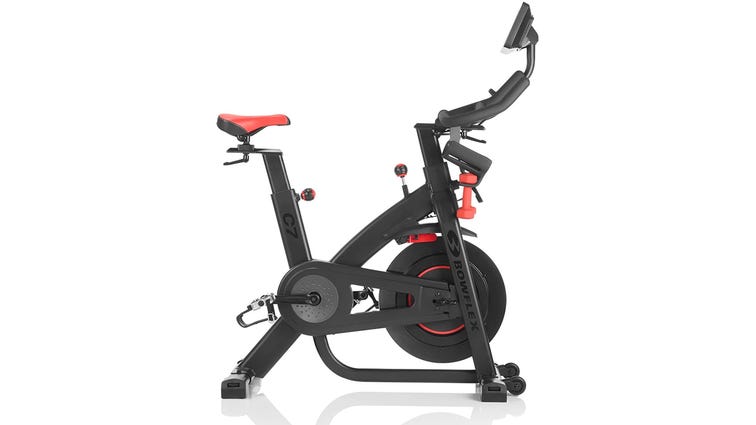

Bowflex
As cool as the Bowflex Velocore is, there’s no denying it takes up a lot of room and isn’t exactly cheap. If there was a way to keep a lot of the core benefits to the Bowflex experience for way less, the C7 is it. There’s no side-to-side leaning for core workouts and the display is considerably smaller, with speakers that aren’t all that great. But it’s way less expensive than most other exercise bikes. (I’ve tested the similar C6.)
That little screen also offers all the same great features you get with the Velocore, which means Netflix and all of the other streaming services are right there with the standard suite of workouts. It’s a great compromise, especially if you just want a solid magnetic resistance bike for those rare days when you can’t ride your bike outside. But if what you’re looking for is a wallet-friendly bike that’s actually enjoyable to use, this is the best option.

 \n ","topic":"","ttag":"","variant":"","viewguid":"","event":"listicle|image|5","correlationId":"","_destCat":"https:\/\/www.backcountry.com\/wahoo-fitness-kickr-bike","productName":"Wahoo Kickr Bike","formatType":"IMAGE","location":"LIST","position":5,"sku":"","dwLinkTag":"article-body|listicle|image","selector":"#article-body #listicle-512a29fb-ea17-45ff-8912-f6db45173dbe .itemImage"}}” rel=”noopener nofollow” target=”_blank”>
\n ","topic":"","ttag":"","variant":"","viewguid":"","event":"listicle|image|5","correlationId":"","_destCat":"https:\/\/www.backcountry.com\/wahoo-fitness-kickr-bike","productName":"Wahoo Kickr Bike","formatType":"IMAGE","location":"LIST","position":5,"sku":"","dwLinkTag":"article-body|listicle|image","selector":"#article-body #listicle-512a29fb-ea17-45ff-8912-f6db45173dbe .itemImage"}}” rel=”noopener nofollow” target=”_blank”>
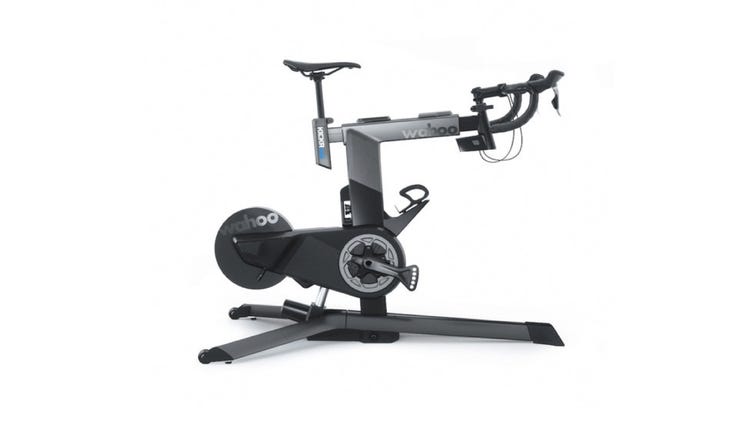

Wahoo Fitness
Exercise bikes do a great job giving you a solid workout on something that usually feels sort of like a bike, but that experience is frequently not enough for those who spend an hour or more a day outside on their road bikes. When it’s important for your indoor riding experience to feel just as real and challenging as your outdoor riding experience, and you don’t want to use your actual bike indoors, there’s really only one option.
The Wahoo KICKR is the closest thing you’ll get to a real bike, right down to the customizable gearing and simulated shifting. The aggressive seating position is designed to mimic a racing road bike, and the resistance you feel when riding matches the software you’re using. That means when your virtual ride in Zwift or other apps starts to go uphill, the bike adjusts your resistance automatically to give you the most realistic feeling possible as you ride. This is the only exercise bike capable of making you feel like you’re actually riding where the virtual ride shows you on the screen, and it’s incredible.
If you’re a serious cyclist looking to improve your performance when it gets cold and dark outside, and you’re unwilling to sacrifice that real bike feeling to get it, the Wahoo KICKR bike is your best option. But like all things designed for hyper accuracy in the cycling world, you’ll absolutely pay for the privilege. But if you go this route and add in the real-feel wind fans and a big enough screen, you might forget for a moment that you’re actually riding inside.

 \n ","topic":"","ttag":"","variant":"","viewguid":"","event":"listicle|image|6","correlationId":"","_destCat":"https:\/\/www.amazon.com\/dp\/B07WP6JTN4","productName":"Saris H3 Indoor Trainer","formatType":"IMAGE","location":"LIST","position":6,"sku":"","dwLinkTag":"article-body|listicle|image","selector":"#article-body #listicle-b664c916-95c6-4b37-9093-31fd7560be65 .itemImage"}}” rel=”noopener nofollow” target=”_blank”>
\n ","topic":"","ttag":"","variant":"","viewguid":"","event":"listicle|image|6","correlationId":"","_destCat":"https:\/\/www.amazon.com\/dp\/B07WP6JTN4","productName":"Saris H3 Indoor Trainer","formatType":"IMAGE","location":"LIST","position":6,"sku":"","dwLinkTag":"article-body|listicle|image","selector":"#article-body #listicle-b664c916-95c6-4b37-9093-31fd7560be65 .itemImage"}}” rel=”noopener nofollow” target=”_blank”>
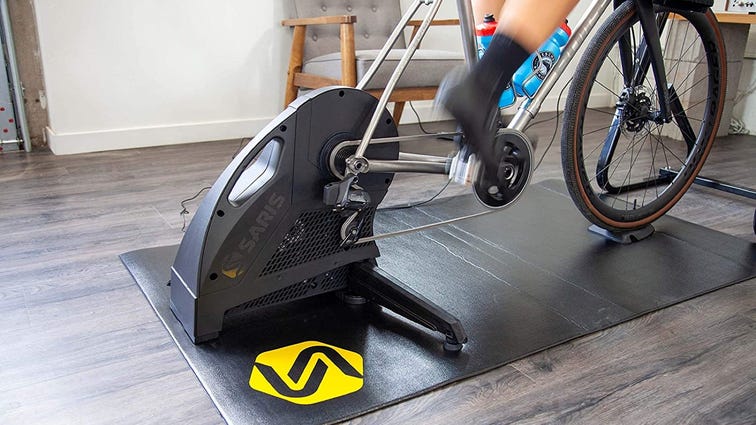

Saris
You know what’s better than an indoor bike? The outdoor bike I already own. If you’re like me and have a bike you love, it’s a shame to leave it hanging on your wall when it’s too cold to ride outside. Instead of buying a separate exercise bike to ride when you can’t ride outside, you can instead use a Direct Drive Trainer. And if you’re going to go this far, you really want to make sure it’s smart enough to intelligently adjust along with your favorite workout apps.
Swap out your rear wheel for the Saris H3 and you now have a balanced surface with built-in cadence, speed, and power sensors to give you the data you need to measure performance. These sensors communicate with everything from Zwift, BKOOL and TrainerRoad to the included one-month access to Rouvy to offer an interactive experience. Resistance changes based on what you see in your app of choice, and since you’re using your real bike, your power and shifting will reflect that same real-world feel.
There are a lot of indoor trainers you can use, but if you’re looking for a combination of smart feedback, performance monitoring and price this is the way to go.

 \n ","topic":"","ttag":"","variant":"","viewguid":"","event":"listicle|image|7","correlationId":"","_destCat":"https:\/\/www.amazon.com\/Schwinn-IC4-Indoor-Cycling-Bike\/dp\/B07WZXSDKW","productName":"Schwinn IC4","formatType":"IMAGE","location":"LIST","position":7,"sku":"","dwLinkTag":"article-body|listicle|image","selector":"#article-body #listicle-74da7ddc-cbff-4968-bafb-99fef40e224c .itemImage"}}” rel=”noopener nofollow” target=”_blank”>
\n ","topic":"","ttag":"","variant":"","viewguid":"","event":"listicle|image|7","correlationId":"","_destCat":"https:\/\/www.amazon.com\/Schwinn-IC4-Indoor-Cycling-Bike\/dp\/B07WZXSDKW","productName":"Schwinn IC4","formatType":"IMAGE","location":"LIST","position":7,"sku":"","dwLinkTag":"article-body|listicle|image","selector":"#article-body #listicle-74da7ddc-cbff-4968-bafb-99fef40e224c .itemImage"}}” rel=”noopener nofollow” target=”_blank”>
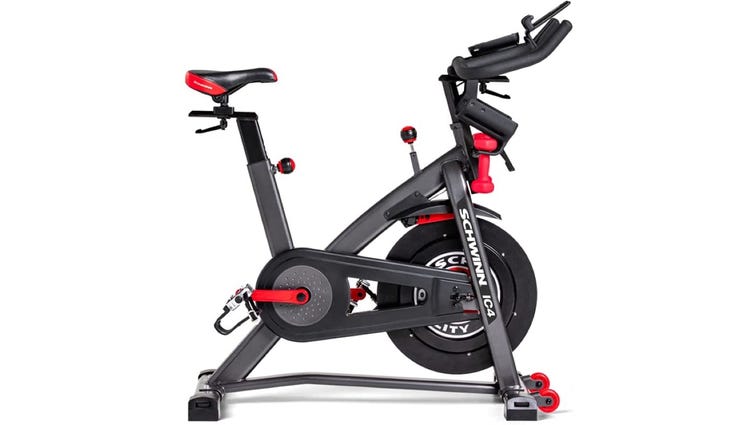

Schwinn
Schwinn has been a respected name in cycling for a very long time, and its indoor bikes are no exception. The IC4 is a great compact indoor bike with a magnetic resistance system and a small LCD display to show you basic performance stats. It’s decently customizable, and surprisingly easy to move around because it’s got friendly wheels and only weighs 106 pounds. The big thing this bike is useful for is plugging in to other apps, which you can do with either the tablet dock or a TV mounted in your workout room.
The basic display on the Schwinn IC4 connects via Bluetooth to your phone or tablet with cycling apps onboard, and the performance recorded on the bike can be translated to those apps with ease. This means you can use the Peloton app or Zwift and easily work out the way you want to, using whatever screen you choose.
It’s worth mentioning that there are a few accuracy discrepancies with the default configuration of this bike and some apps. Zwift, for example, will show you going much faster than you’re actually going and that can skew results if you’re racing friends or participating in daily challenges. There’s a calibration you can perform to correct this, but it’s something you’d need to do yourself if you’re concerned about accuracy in some third-party cycling apps.
The information contained in this article is for educational and informational purposes only and is not intended as health or medical advice. Always consult a physician or other qualified health provider regarding any questions you may have about a medical condition or health objectives.
